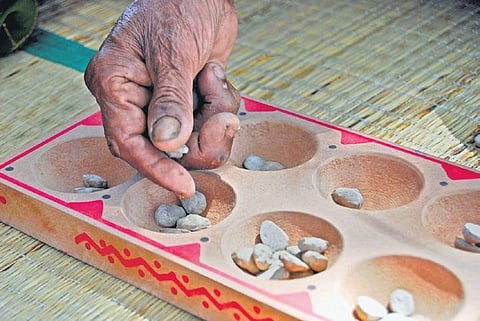

CHENNAI: Before the advent of mobile phones, it was the traditional 'come-sit-on-the-veranda-and-play' style games that kept generations entertained. They helped them strategise and socialise at once. One such game, which is now being erased out of popular culture is pallankuzhi.
A few days ago, the Turkish traditional strategy and intelligence game 'Mangala' made it to the UNESCO's prestigious representative list of Intangible Cultural Heritage.
The game broadly comes under ‘mancala’, a generic name for a family of two-player, turn-based, strategy board games - played on pits dug in the ground or on special boards using small stones, seeds or beads.
Among the many versions of the pit and pebble games is our often forgotten Pallankuzhi. It's popularly called ‘Ali guli mane’ in Karnataka, Vamana guntalu in Andhra Pradesh, and Kuzhipara in Kerala.
V Balambal, a retired history professor and author of 'Folk Games of Tamil Nadu' has briefly made a mention in her book about the lesser-known versions of the game being played in Punjab, Assam, and Odisha. "'Pal' means many and 'kuzhi' means pit.
The boards to play the game come in different sizes, metals, and shapes, and have seven pits on two columns, in default. The game continues to remain a fascination for scholars and researchers who have been keen on unravelling its many anthropological, historical, and social aspects.
Studies also reveal that there are nearly ten different moderations in which Pallankuzhi is played, namely: Pasupandi, Saripandi, Muthupandi, Ethirpandi, Rajapandi, Thaichipandi, Arisipandi, Kasipandi, Kattupad, and Seethaipandi,” explains Balambal.
It’s unfortunate that the place and time of origin of Pallankuzhi have been under speculation for many years now. "Archeologists and historians have different theories. We've chanced upon inscriptions of traditional games on walls of a few temples and stone carvings but that doesn’t say much. I have been lucky enough to see many forms of mancala games being played in Syria and Africa during my travel. While the game is being played by men in Africa, it is played by women in Sri Lanka, Malaysia, and Singapore. Recently, I even spotted a four-row Pallankuzhi in Mahabalipuram. Chances are high that the game might have been passed on to us during the trade exchanges," speculates Vinita Sidhartha, the brain behind Kreeda Games, Chennai.
Mathematical insight, cognitive skills, motor skills, handeye- coordination, and many such educational values of Pallankuzhi are aplenty. Vinita suggests that Pallankuzhi is often prescribed by Ayurveda doctors as an exercise to treat arthritis in fingers. The touch-and-feel nature of the seeds or shells used in the game is said to have a therapeutic effect on fingers and body.
"The coordination of fingers to take the game pieces from the pit, swiftness in distributing them to other pits, analysing the capacity of the opponent, remembering the coins in each pit, calculating the coins and expecting the outcomes are crucial features of the board games," points out Balambal.
While the pallankuzhi boards are safely deposited in the lofts of many Indian houses, the mancala board games are played in tournaments in other parts of the world, such as, the Middle-East regions, Africa, Spain, and London.
According to World Nomad Games, an international sports competition dedicated to ethnic sports practised in Central Asia, there are 400 types of mancala games, but its most popular in Africa, where more than 90 varieties exist.
"The number of pits, players, rules, and names vary. The point is that its legacy is passed on to the younger generations. A few museums abroad have also started collecting mancala board games. It’s unfortunate that though there are varieties of Pallankuzhi played in TN, the concept of collection for posterity never occurred to Indians," narrates Balambal.
Concurring, Vinita highlights that it’s our responsibility to preserve folk traditions. "These games reflect a way of life tha'’s vanishing and needs to be documented. India is home to a plethora of long-forgotten games. They need to be revived and there’s a long road ahead. I'm glad that the awareness is increasing among people. If we want recognition, then we need to work for it," she says.
As we have failed to pass on the legacy
Balambal says, "It’s unfortunate that though there are varieties of Pallanguzhi played in Tamil Nadu, the
concept of collection for posterity never occurred to Indians."